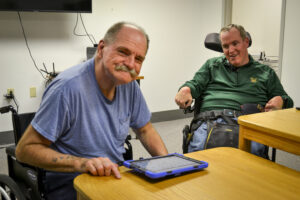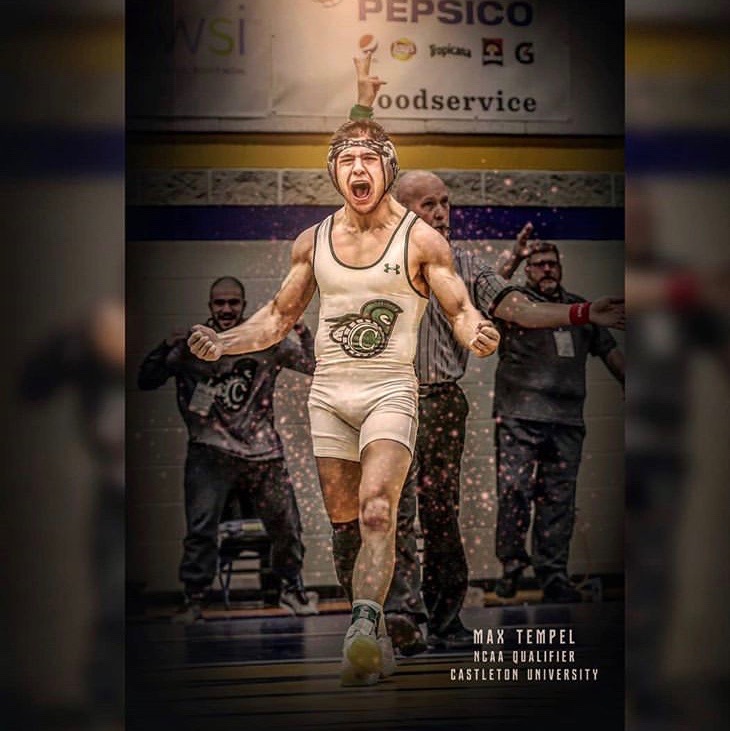Helping those in need

Gene Sumner, left, uses his new device with the help of assistive technology specialist Ben Wimett, right.
Gene Sumner is your typical 68-year-old man – funny and persistently independent. He likes his daily routines, his coffee and his cop shows. He also loves taking long drives in his pick-up truck, hunting and woodworking.
But most wouldn’t be able to know these things, since Gene can only speak in single-word phrases.
Gene has cerebral palsy.
His specific case of CP interferes with the part of his brain controlling speech, and severely limits his ability to communicate.
It seems difficult to understand his noises at first for those who don’t speak fluent ‘Gene’ yet, his friends say.
However, by using an app called Proloquo2go, which can formulate sentences based on touching certain picture icons, Gene was recently able to construct his first full sentence in his life.
Sumner, as full of humor as he is, used his first sentence to tell someone he wanted a hot dog for lunch.
There are numerous “first” stories as simple and powerful as Gene’s originating from the newly implemented Castleton University Assistive Technology Tryout Center, located in room 138 of Stafford Academic Center.
The 2,400 devices available for 30-day rental periods are free to all Vermonters, both students and community members.
Currently, 80% of those using the services are students, while the community makes for the other 20%, said Ben Wimett, assistive technology access specialist at Castleton.
Wimett, who’s been working in AT for five years based out of Rutland, normally gets about 30 cases a year to keep him busy.
“Within the first month of being open here at Castleton, I already beat my general public numbers for the Rutland office for the entire previous year,” he said.
“It’s been really busy here.”
Assistive technology is defined in the Assistive Technology Act of 2004 as, “any item, piece of equipment, or product system, used to increase, maintain, or improve functional capabilities of individuals with disabilities.”
Items for rent range from adapted keyboards for low-vision and color therapy glasses for emotional regulation to basic left-handed scissors.
The Castleton AT Tryout Center became the fourth regional tryout center across Vermont over the summer, operating under the state-wide Vermont Assistive Technology Program.
Gerry Volpe, coordinator of Disability Services at Castleton, said he’s referred 20 or more students to the AT center, but said he knows there are others who could benefit from it.
“Here in the Academic Support Center, we’ve talked about how it’s important to encourage all students, and not just those with disabilities, to utilize assistive technology within appropriate boundaries,” Volpe said.
For example, Volpe says, “Anyone can find use in a voice-to-text program on their computer to do a rough draft.”
Before the center’s implementation, his department offered only a few smart pens to loan out, and a page on the Castleton website with some links for text readers, Volpe said.
Volpe emphasized how finding resources for students with hearing impairments had previously been difficult.
“I had to spend a lot of time talking to different experts and consultants who have a firmer understanding since it’s not a specialty of mine what level of intervention is needed. Whereas now, Ben has so much expertise that it’s sort of a one-stop-shop,” he said.
Wimett, Castleton’s AT specialist, said he enjoys helping others find the right tools to unlock their potential.
“Even using the voice recorder on your phone to record this interview, believe it or not, is one of the tools that we tell people they need to not be afraid to use,” Wimett said.
Wimett, having cerebral palsy himself, identifies with how useful assistive technologies are in general. One of his favorite tools is Amazon Echo, which allows a lot of independence for those who are paralyzed.
At Castleton University, smart pens are the number one requested item, according to Wimett.
A smart pen captures handwriting on special notebook paper, converts the information into digital data, and simultaneously records audio.
Wimett says it’s useful for students who get stuck on spelling when taking notes, or can’t keep up with the lecture.
For instance, when reviewing their notes, a student can tap on the headline of the first section they need to review, and the audio will start playing from that specific section of the lecture.
Wimett eagerly suggested a smart pen as the perfect tool for journalists when interviewing.
Due to high demand, these pens are low in stock across all of the Vermont AT centers.
Still, that didn’t stop one student from getting her device.
During her consultation with Wimett, they were able to locate a pen for her in South Burlington. Afterwards, she hopped in her car, drove the hour and a half to pick up the device, and has felt more at ease in class ever since, she said.
Another community member lost his job as a result of a stroke because he could no longer say sentences without getting stuck.
Now, he’s gained his independence back by a type-to-talk app and is working full time, he said.
Rachel Knapp is another assistive technology specialist who regularly coordinates with Wimett’s sector. She’s located at the Linking Learning to Careers program in Barre, and has also had a share of AT successes that have even led to student employment.
Knapp explained how her program was able to provide a graphic design student with an Apple pencil and iPad to design logos, where the student had previously been sketching up her logos on paper and digitizing them on a computer-based tablet.
With the iPad, the student can now layer her multiple sketches and end up with her logo ready for digital sharing all within a single app.
“Now she’s also getting paid for her logo work,” said Knapp.
All centers across Vermont, especially the recent Castleton AT center, are actively redefining what it means to cater to the entirety of those with impairments, and enable them to be independent and participate in education, work, and the community.
Wimett says he’s grateful the Castleton center has opened because he can help people like Gene Sumner, who have been overlooked by others and who wouldn’t have been able to make it to his office in Rutland.
“Gene totally knows what he wants to say. Upstairs all the lights are on and there’s people home. He just has to find the people that want to listen to the story and be in that house so he can share his experiences and life. These tools have allowed him to elaborate and expand his story,” Wimett said.
Wimett is looking for a partner interested in meeting up with Sumner on a weekly basis to practice conversations using his new device. Those interested can contact Wimett at ben.wimett@partner.vermont.gov.







